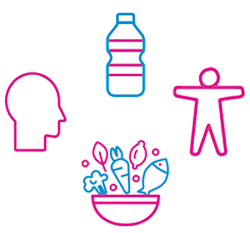What is the menopause?
The menopause is the time of life when someone's periods stop, officially diagnosed when there has been no menstrual period for 12 months. It usually occurs between the ages of 45 and 55 and in the UK, with the average age of menopause being 51. Some may experience early menopause - when the menstrual cycle stops before the age of 45.
FAQs
Advice and support
For advice and support, take a look at some of our articles on how to look after your mental wellbeing during the menopause, the symptoms and what to expect.


The Benenden Health App Let's talk menopause
Whatever menopause advice you need, you’ll find a handy hub of information, videos and courses all now available on the Benenden Health app.
Courses to guide you through every stage and symptom, such as spotting the early signs and managing your symptoms at work.
Live events with medical experts who can answer your questions and talk about the effect menopause can have on things like sleep and sex.
Informative videos covering a range of topics and and signposting where to go for further support.

Key questions on how the menopause effects mental wellbeing answered. Discover why going through the menopause can affect your mood and 7 actionable tips on ways to tackle low mood.

Learn about the 4 key stages of the menopause, the typical symptoms of premenopause, perimenopause, menopause and postmenopause.

Heard of a female friend or family member going through the menopause but have no idea what it means or how you can support? Become equipped with knowledge on the menopause with this key information.

A recent survey of UK employers indicated that 3 in 10 team members had suffered poor health due to the menopause. Find out what employers can do to help and why it matters that employers are offering support.

Both employees and employers agree there is still a lot of stigma around menopause in the workplace, with stark differences, depending on age, in the number of those who identify as female say they would feel comfortable discussing menopause and asking for support.
Support with the menopause

Our Mental Health Helpline
Did you know that CBT, a type of therapy, has an evidence base to support hot flushes and night sweats?
Benenden Health members can access mental health support whenever you need it with our 24/7 mental health helpline.
You’ll be put straight through to a qualified counsellor who can provide immediate emotional support and signposting for menopausal health concerns.

Sign up for health and wellbeing tips
Get top tips about the mind, body, health, wellbeing and nutrition straight to your inbox.


